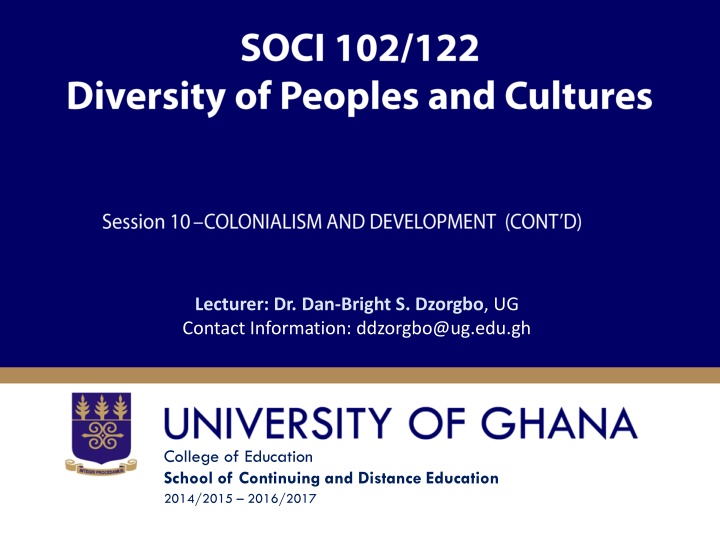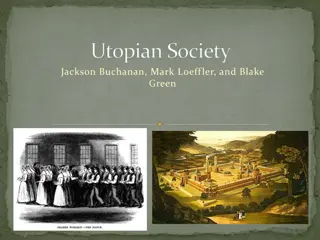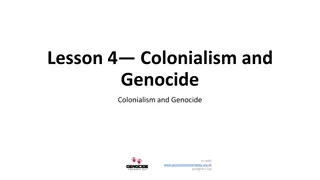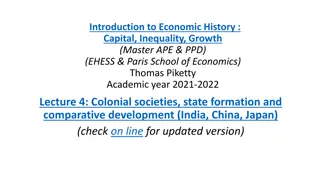The Impact of Colonialism on Societies
This session explores the consequences of colonialism on colonized peoples psychologically, socially, economically, and politically. Dr. Dan-Bright S. Dzorgbo discusses the effects of colonialism and neocolonialism, highlighting global implications and the imposition of foreign language, religion, and culture. The session also delves into the ethnic compositions affected by colonialism and the justification used by colonial powers. Recommended readings are provided to further understand the topic.
Download Presentation

Please find below an Image/Link to download the presentation.
The content on the website is provided AS IS for your information and personal use only. It may not be sold, licensed, or shared on other websites without obtaining consent from the author.If you encounter any issues during the download, it is possible that the publisher has removed the file from their server.
You are allowed to download the files provided on this website for personal or commercial use, subject to the condition that they are used lawfully. All files are the property of their respective owners.
The content on the website is provided AS IS for your information and personal use only. It may not be sold, licensed, or shared on other websites without obtaining consent from the author.
E N D
Presentation Transcript
Lecturer: Dr. Dan-Bright S. Dzorgbo, UG Contact Information: ddzorgbo@ug.edu.gh College of Education School of Continuing and Distance Education 2014/2015 2016/2017
Session Overview Introduction In this session, we continue to discuss on colonialism and its consequences for the colonised people and their societies. We explore the psychological, social economic and political consequences of colonialism for the developing world as well as its global implications. Objectives At the end of the session, the student will be able to: explain the psychological effects of colonialism on the colonised people Explain the socio-economic effects of colonialism on the colonies Explain the global implications of colonialism and the concept of Neocolonialism Slide 2 Dr. Dan-Bright S. Dzorgbo, Sociology Dept. UG
Session Outline The session is divided into two topics. They are: Topic One: Impact of Colonialism Topic Two: Global Exploitation and Neo-Colonialism Slide 3 Dr. Dan-Bright S. Dzorgbo, Sociology Dept. UG
Reading List Assimeng, M. (1999), Social Structure of Ghana, Tema, Ghana Publishing Corporation. Kottak, C. P. (2004), Cultural Anthropology, Boston, McGraw Hill Corporation. Kottak, C. P. (2004), Anthropology: The Exploration of Human Diversity, Boston, McGraw Hill Corporation. Nolan, P. & G. Lenski, (2004 or any of the newer editions), Human Societies: An introduction to macrosociology, Boulder Paradigm Publishers. Nukunya, G. K. (2006), Tradition and change in Ghana: An introduction to sociology, Accra, Ghana University Press. Sanderson, S. K. & A. S. Alderson (2005 or its newer editions), World societies: the evolution of human life, Boston, Pearson Education Inc. Slide 4 Dr. Dan-Bright S. Dzorgbo, Sociology Dept. UG
Topic one: Impact of Colonialism Colonialism brought together under one colonial state many diverse ethnic groups which hitherto existed as relatively autonomous of each other. For example, in Ghana we have the Asante, the Fante, the Ga, the Ewe, the Dagomba, etc. together to form a nation. Consider Nigeria, Sudan, Uganda, in similar terms and identify their ethnic compositions Colonialism brought about the imposition of foreign language, Christian religion and western culture Colonialism created a state machinery for administering the colonies and even the independent nations in modern times. In order to justify colonialism and hide its main objectives of exploiting the colonized peoples resources and using them as markets for manufactured goods from Europe, the colonial masters said they were on a civilizing mission. In this regard, the British proclaimed the white man s burden and France mission civilisatrice that they were on civilizing mission Slide 5 Dr. Dan-Bright S. Dzorgbo, Sociology Dept. UG
Topic one: Impact of Colonialism (contd) In order to justify colonialism, the colonial powers defined the colonized people as uncivilized, barbaric, savages and only by adopting the colonial masters language, religion, values, and indeed the total way of life could they be considered as civilized and modern Africans, for example, were taught to speak the colonialist language, English, French, Portuguese, etc. and so followed the subtle introduction of western ideas, norms, values, etc. to African and consequently, the gradual undermining of Africans ways of life Africans were also taught to adopt Christianity and were to reject their traditional modes of religion Colonialism deprived the colonized people of their resources: gold , diamond, nickel, copper, iron, uranium, bauxite, timber, etc. These resources were taken away and used to developed Europe while impoverishing Africa and holding its material progress back. Slide 6 Dr. Dan-Bright S. Dzorgbo, Sociology Dept. UG
Topic one: Impact of Colonialism (contd) In some parts of Africa, Africans lost fertile agricultural lands to the colonial masters or their lands were forcefully taken away from them as happened in many countries in Eastern and Southern Africa. In these parts of Africa, Europeans decided to stay for ever. For example South Africa, Namibia, Kenya, Zimbabwe, etc. and so dispossessed Africans of their lands and resources. Colonialism converted African countries into producers of raw materials (cocoa, coffee, groundnuts, sisal, tea, etc.) and consumers of Europeans/Western manufactured goods and technologies. There was negative psychological impacts of colonialism on Africans. Because Africans were considered as uncivilized and were in need civilization, and because they were conquered and colonized, Europeans and for that matter the whole of the white race and people of the lighter skin across the whole world often assume feelings of superiority over Africans The relegate Africans to inferior status a phenomenon that continues to be the basis of racism or racial discrimination and mental oppression that Africans and people of African descent continue to suffer in our contemporary time. Slide 7 Dr. Dan-Bright S. Dzorgbo, Sociology Dept. UG
Topic one: Impact of Colonialism (contd) Colonialism undermined, if not blocked, Africa s own internal evolution and development Colonialism initiated and accelerated on a large scale interactions among diverse groups and societies in the world and began incorporating them into a global economy whose ramifications have accelerated in recent years and brought about the concept of globalization. Colonialism changed the entire face many groups, societies and cultures such that today all societies no longer exist in their pure unadulterated versions Colonialism created and continues to create cultural imperialism Slide 8 Dr. Dan-Bright S. Dzorgbo, Sociology Dept. UG
Topic Two: Global Exploitation and Neocolonialism Even though many groups or colonies have attained independence, the colonial masters and the rich nations of this world, continue to exert control over them in many areas. They continue to extract resources and wealth from the poor nations through more and more enlightened and subtle ways. For example, the rich nations would claim that they help the poor nations to develop but the whole exercise of development is mainly for their own benefit. Colonialism also brought the colonized world into an emerging global capitalist world and also make them dependent to the developed, rich mainly capitalist, world. Many countries are now formally independent but in reality they are still colonized in a new way hence the concept of neo-colonialism introduced by Kwame Nkrumah to describe this new situation. Slide 9 Dr. Dan-Bright S. Dzorgbo, Sociology Dept. UG
Conclusion In this session, We explored the psychological, socio-economic and political consequences of colonialism for the developing world and its citizens We noted that colonialism integrated the colonies into a global world economy in which (even though they are independent) they play only a subordinate role We explored the global implications of colonialism and the new forms of colonialism or Neo-colonialism Slide 10 Dr. Dan-Bright S. Dzorgbo, Sociology Dept. UG























